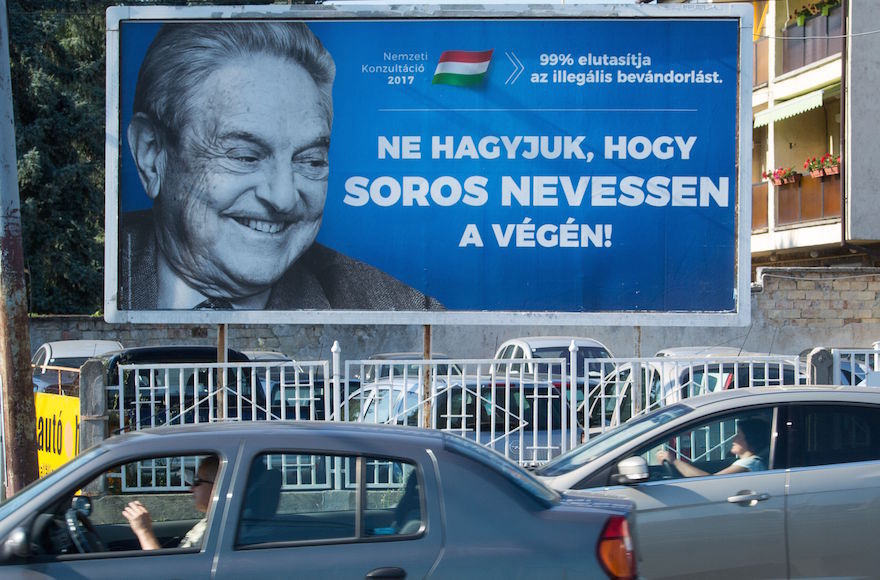(JTA) — Hungary’s government denied a report that it prematurely ended its media campaign against billionaire George Soros amid pressure by leaders of Hungarian Jewry and Israel’s Foreign Ministry.
The report appeared Wednesday on the news website of the ATV television station, which is highly critical of the policies of Hungary’s right-wing prime minister, Viktor Orban.
ATV reported that posters attacking Soros would be removed ahead of next week’s visit by Israeli Prime Minister Benjamin Netanyahu to Budapest. The posters mock Soros, a left-leaning Jewish philanthropist, for his support of efforts to help immigrants from the Middle East resettle in Hungary and elsewhere in Europe.
“As part of the preparations, it was decided it was better if Netanyahu does not see any posters that violate the sensitivity of the Hungarian Jewish community,” the report said.
But a government spokesman on Wednesday told JTA that the six-week campaign, which began in May, is ending as scheduled, not because of Netanyahu’s visit or any other reason.
The campaign was “a success because it broke participation records and provided a very clear result: The Hungarians will not allow decisions that affect them to be made without them,” the spokesman wrote in an email. “We expect drawn out disputes on the issue.”
Mazsihisz, an umbrella group of Hungarian Jewish communities, has urged the government to stop its campaign against Soros, which featured posters showing a laughing Soros and the tag line reading, “Don’t let Soros have the last laugh.” Citing Soros’ Jewish ethnicity, Mazsihisz warned that the campaign risks encouraging anti-Semitism.
Not all Jewish groups agreed. EMIH, an influential Jewish group affiliated with the Chabad-Lubavitch movement, criticized Mazsihisz for “injecting themselves into the debate about Soros.”
“They are in a sense appropriating his politics and associating them with the Jewish community,” EMIH’s leader, Rabbi Slomo Koves, told JTA.
Israel’s ambassador to Hungary, Yossi Amrani, published a statement last week that repeated the Mazsihisz criticism of the campaign, but Israel’s Foreign Ministry subsequently published what its spokesman, Emmanuel Nachshon, called a “clarification.”
It said that Amrani’s statement was meant only to reflect Israel’s rejection of anti-Semitism and support for Jewish communities in “any country.” The Israeli government is often at odds with Soros, who funds Israeli and Palestinian NGOs that are often critical of Israeli policy. According to the Foreign Minsitry, Amrani’s statement was not “meant to delegitimize criticism of George Soros, who continuously undermines Israel’s democratically elected governments by funding organizations that defame the Jewish state and seek to deny it the right to defend itself.”
Despite the government’s denial of the ATV report, a Mazsihisz official credited Jewish objections in a Facebook post. Rabbi Zoltán Radnóti, the chairman of the rabbinical council of Mazsihisz, attributed the termination of the campaign to “the clear voice of the Hungarian Jewish community as well as many decent Hungarian citizens and others worldwide” who “made this happen.”
JTA has documented Jewish history in real-time for over a century. Keep our journalism strong by joining us in supporting independent, award-winning reporting.






